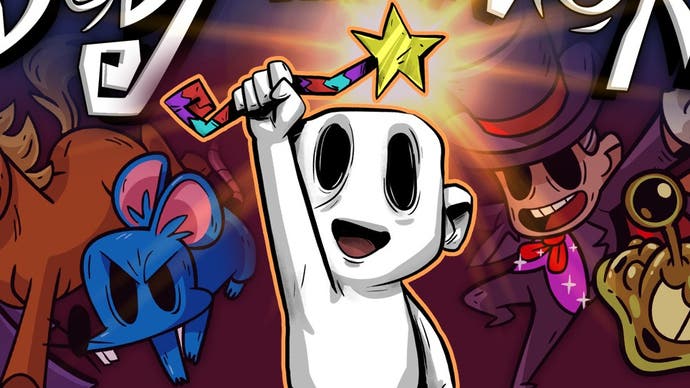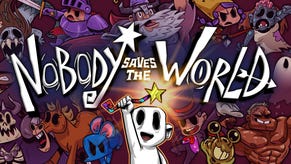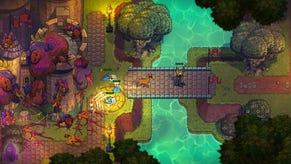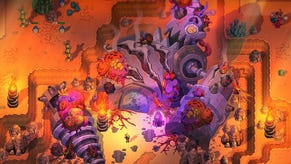Nobody Saves the World review - a shape-shifting treat
Forms follow function.
Nobody Saves The World might have the most accurate cats in any game ever. Imperious, judgey, capable of magic. I tend to kill them immediately when they appear -because of their area denial swipe storm attack - so I don't get time to really study them, but this morning I found a trailer and paused it on a screen filled with Nobody's cats: drawn up tall, ears nobly architectural with those straight lines and points, pupils contracted to the degree where they look like little nigella seeds standing on end. The cloak with its prog collar and elegant folds, the inevitable arcane medallion: ninety percent sure that if cats could dress, this is what they would choose to leave the house in.
I love the cats. But honestly, that's just the start of things I love about this game. It's a high-wire proposition: an ARPG in which the character you play as, the person chosen to save a fantasy world from a great calamity - it's literally called the Calamity I think - is nobody. And they look like nobody: pasty and sketched in, eyes like railway tunnels disappearing into some pale mountain, a face gently lined by cubicle living and cubicle fretting, a slouch.
But this is Drinkbox, a studio whose recent games reveal a mastery of colour and character and challenge and fun. So this sad, unbaked cookie, this Dilbert, is only the basic form of the hero. Granted a magic wand they can transform into other creatures - a rat early on, if I remember correctly, but also guards, archers, robots, dragons, and so much between. Unlockable hero forms each with their own attacks and perks and abilities, unlockable hero forms you can switch between on the fly. So when you want to move over water, maybe select a form like the ghost? When you want to sneak through gaps maybe select the skittering rat? When you want...hmmm. What might the egg form be good for?
Truly a high-wire proposition. Most people I suspect will know Drinkbox from Guacamelee, an intricate take on an intricate form - the beat-'em-up Metroidvania. Guacamelee was fun, but it was punishing fun. Those bosses! Those traversal challenges! A game for leaning forward, leaning into the screen, giving it your everything. An ARPG is a very different proposition. They have intricacies and theorycrafting and precision in their way, but I suspect a lot of people - I can't be entirely alone here - play them leaning back in the chair, chewing through mobs and Pop-Tarts, kiting, cornering, playing by the map screen in the corner as much as the big screen where the particles are unfolding, turning geography and distance traveled almost directly into XP. Could Drinkbox handle such a different kind of fun?
Absolutely. It took a while for me to understand entirely what I was playing, but Nobody is a wonderful ARPG. It has its own quirks with leveling - you level in chunks by completing quests, and you also earn wands at the same time, which allow you to unlock certain story-pacing set-pieces - but it has dungeons, masses of enemies that like to attack in one scrabbling rush, and that form-switching business which means you can play across the classes in one go. No thirty hours in and wishing you'd chosen the Paladin rather than the Demon Hunter. Nice.
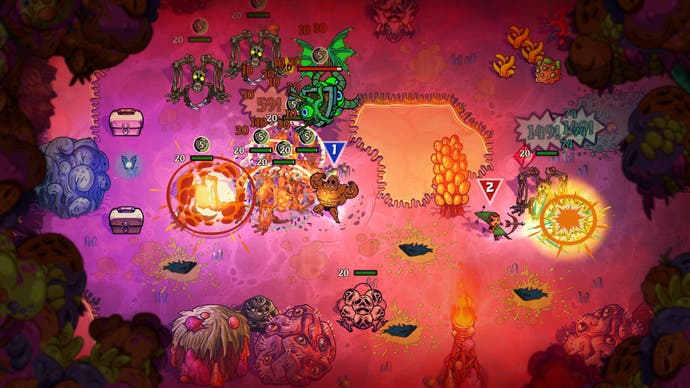
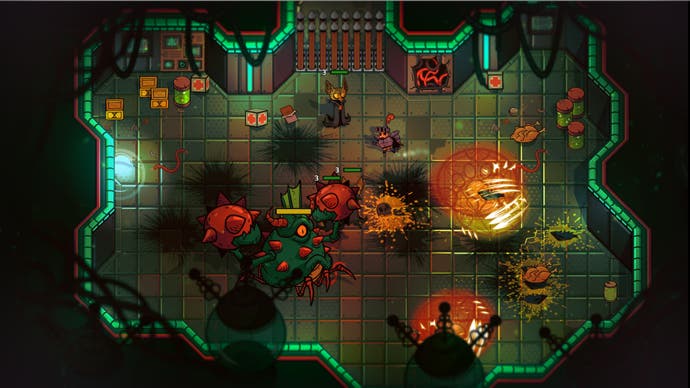
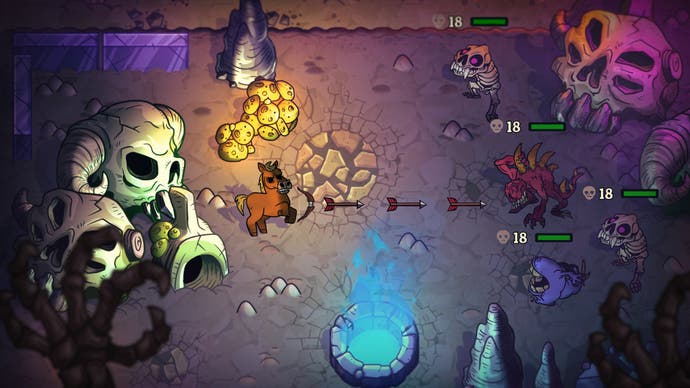
Let's start with those classes. Each form has its own signature attacks and unlockable perks, generally giving you a nice targeted option and a heavier attack that relies on a mana recharge pretty early on. But before too long you are encouraged to work on your own builds, keeping the signature attacks for each form but layering in attacks and perks from other forms. So maybe your ghost has your rat's poison bite as well as its main area-damage spooky business. Maybe your archer gets another form's knockback stomp to give it a bit of room while an arrow is charging.
Yes yes, but more. Enemies increasingly break down into one of four damage types, each announced with an icon and a colour. So if you're trying to poison enemies who really only succumb to sharp damage, you need to mix things up, at least until you've broken the ward. Your forms, meanwhile, tend to specialise in one form of damage, so you need to mix and match and build them into more well-rounded creations.
Example. For a long time I was stuck on a dungeon with enemies that were resistant to everything but green and yellow attacks. (These are not the technical terms.) I was using my magician, who was a natural for yellow damage - signature move, of course, is hitting people with a fan of cards. That left the greenies. Archery skills are green, but they tend to be slow and a bit too precise for the way I like to play, in all my fat-fingered glory. So I muddled around, and while I didn't find the right magician build for that dungeon - I think I cleared it with more of a swipy tank character, lots of green damage but some yellow-damage glitter bombs nicked from the magician - I did find a great magician build that I went on using for the next few dungeons. Conjured bunnies and leopards were the key - they used lots of mana but did lots of damage. The trick to making them sing, though, was adding perks that gave their damage a poisoned edge and then caused them to explode when they expired. Truly the game of kings.
Conjured bunnies and leopards were the key - they used lots of mana but did lots of damage.
There are loads of these builds to find, and the possibilities and permutations grow as you unlock more forms, and unlock more abilities and perks for those forms. This is a great game for watching the numbers go up. And that takes us beyond the classes and forms themselves and out into the world.
Oh, Nobody features a lovely world. Delivered in sort of anarchic black-lined indie comic art, this is a place where wizards run MLMs, where the thieves guild is hidden, as it should be, behind a trick bookcase, and where one dungeon is a gingerbread house and another is a crashed UFO. Tradition but with a bit of a spritz. The world opens up as you get more powerful, and each area is colourful and filled with its own quirks and quests. Alongside the dungeons - some of which are really brutal; all of which, I think, allow for procedural generation - the landscape is littered with quests. Get a fish person the medicine they need to stop being a fish person. Help a horse experience a moment of true love. Beat a witch's lap around a kart track. Work out what to do with all those huge bird's nests scattered about.
Certain areas can only be accessed by certain forms, but while that makes it sound a bit like Wonder Boy 3, another game of kings, in truth, it's more like Link to the Past - another game of kings! The overworld is large, but you're constantly working to understand how it fits together, where the next fast-travel node is, how to access that little section of the forest or lake that seems to be off-limits, how to get to the chest that you can see on top of a cliff but can't find a way to reach.
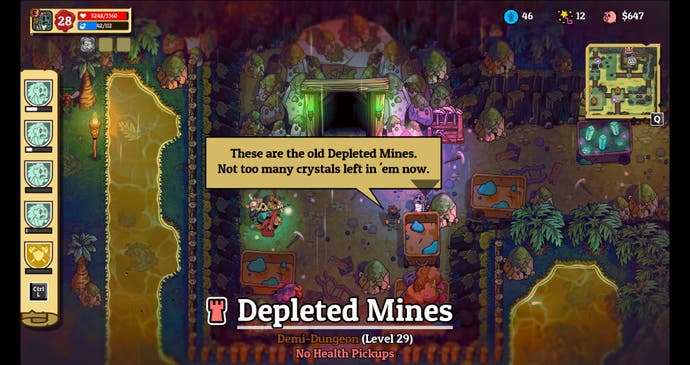
Throw in enemies and you've got a treat. Those cats for sure, with their area denial spells, but also shambling brain-things, zombies, aliens, fire-spitters, all manner of horrible furry wildlife. This is a game of target priorisation, as so many ARPGs are at heart - work out how to take out the big baddies that stand back or rush you, all while chewing through the little ones that race around you like a cloud. After a few hours I realised that, beneath the jokes and the cartoon presentation, Nobody is pretty serious about being an ARPG. No glissando of skills to fire off, but that same sense of being a little lens of damage moving through the world, scouring the landscape as much as finishing off individual baddies.
And like a lot of ARPGs it can get a bit grindy. There were times where I needed to knock out quests to get the wands needed to open up the next big dungeon, or moments where I just needed to level higher, get more money to buy stat boosts, level up individual skills, in order to take on the next challenge. Even here, though, that focus on different forms, all with their own quest lines, comes to the rescue. You grind a lot of the time by just focusing on forms you had perhaps neglected, and through focusing on them coming to understand how they might be useful, how they might have abilities you could use in a different build, and how a little hard work here might unlock yet another form, meaning that the whole thing repeats and expands, your options growing outwards as the game piles on the colour and the jokes, opening up the map and offering a few genuine surprises along the way.
It's a surprisingly big game, and extremely replayable, I think. Individual forms might be a bit fiddly - I never got fully used to characters who need to face a certain way to target their attacks - but there's such range. Whenever I got annoyed, I just turned into a ghost and went for a deadly float, to be honest: I always found a new distraction.
That's it, I think: distractions and surprises, all of which allow the numbers to go up. Drinkbox's latest is as polished and colourful as you might expect - and it's as generous too. I had fun. I am still having fun.
